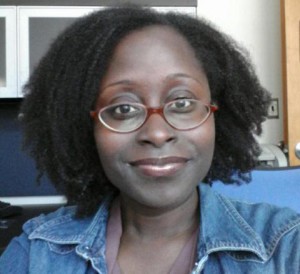 The following Great Innovative Idea is from Gloria Washington, an Assistant Professor of computer science at Howard University. In addition to being an Assistant Professor, Dr. Washington is the Director of the Affective Biometrics Lab. Washington presented her poster, A Socio-Cultural & Technical Approach to Affective Biometrics, at the CCC Symposium on Computing Research, May 9-10, 2016.
The following Great Innovative Idea is from Gloria Washington, an Assistant Professor of computer science at Howard University. In addition to being an Assistant Professor, Dr. Washington is the Director of the Affective Biometrics Lab. Washington presented her poster, A Socio-Cultural & Technical Approach to Affective Biometrics, at the CCC Symposium on Computing Research, May 9-10, 2016.
The Idea
Traditional approaches to biometric recognition and affective computing involve using a database to train computer algorithms to recognize different types of individuals and emotional states. However, these databases are usually not diverse and include only subjects from majority populations. Howard University is developing technologies that can use computer vision and affective computing techniques on a diverse set of subjects to recognize a person’s emotional state and their physical identity.
Impact
Computer science researchers have just begun to explore if cultural information gathered from physical or behavioral characteristics can be used to improve the accuracy of recognizing individuals or emotional states in humans. That is what my research is concerned with: exploiting cultural information for informing existing algorithms and creating new techniques for use in biometrics and affective computing. The potential impact of this research will help computer scientists to create technologies that not only will recognize who you are but what you are feeling inside!
Biometric recognition seems to fail or have reduced accuracy when it comes to recognizing darker-skinned individuals. Howard University, under my direction, is developing a culturally diverse database for use by researchers in biometrics. This database will be available to the public some time in the Fall of 2016.
![]() Also, members of the Affective Biometrics Lab are developing soothing technologies for minimizing the effects of post-traumatic stress disorder by inner-city youths and biometric algorithms for recognizing persons from the beats of their heart. Pilot studies are being performed over both technologies this summer.
Also, members of the Affective Biometrics Lab are developing soothing technologies for minimizing the effects of post-traumatic stress disorder by inner-city youths and biometric algorithms for recognizing persons from the beats of their heart. Pilot studies are being performed over both technologies this summer.
Other Research
Along with my colleagues at Howard University, I perform research over developing socially and culturally-responsive techniques to help young computer scientists learn how to code and think analytically. This research is concerned with the area of computer science education and has been implemented at the high school and undergraduate level. As a part of her research in computer science education, I am holding a summer camp called #WatchMeCode that will teach more than 100 young men of color how to code. In the future, I hope to expand this camp in other major cities such as Baltimore, Atlanta and Houston.
Researcher’s Background
I am currently an Assistant Professor in computer science at University and an Director of the Affective Biometrics Lab. I received my Bachelor’s in computer science from the Lincoln University in Missouri. Upon receiving the National Physical Science Consortium Fellowship, I moved to Washington, DC to attend George Washington University where I obtained my Master’s and PhD in computer science. After completion of the PhD, I completed a two-year Intelligence Community Postdoctoral Fellowship at Clemson University. In addition, I have worked for Government contracting companies like Booz Allen Hamilton and MITRE. In total, I have more than thirteen years experience in consulting and software development.
Links
I can be reached at gloria.washington@howard.edu. Check out my website to find out about the cool projects I am working on here:http://www.cs.ceacs.howard.edu/user/46.
To view more Great Innovative Ideas, please click here.









